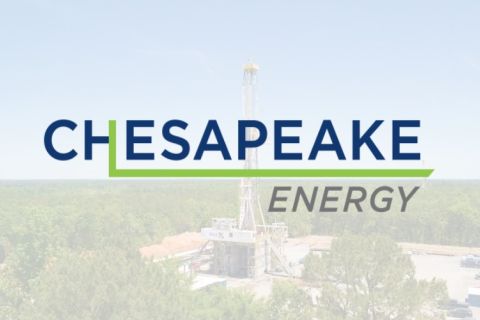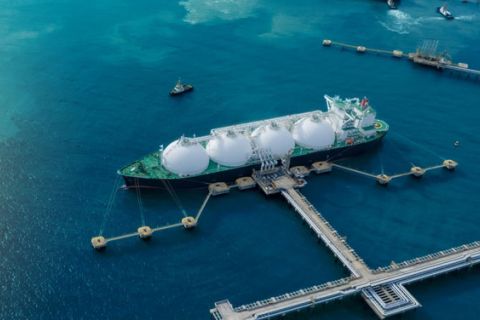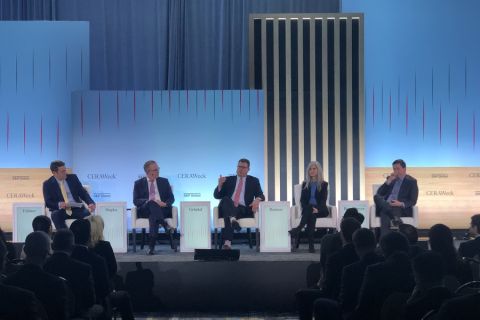Last summer, Rob McKee was enjoying retirement after 36 years at Conoco and ConocoPhillips, most recently as executive vice president, worldwide exploration and production, when he got a phone call: would he go to Baghdad and become the Coalition Provisional Authority's (CPA) new senior advisor to the Iraqi oil minister? "My first reaction was, you've got to be joking. Why would I want to go to Iraq?" says McKee, a Colorado School of Mines petroleum engineering grad. But an impressive group of people he knew in the Bush administration and in the oil industry supported him: Commerce Secretary Don Evans; Daniel Yergin, head of Cambridge Energy Research Associates; Deputy U.S. Defense Secretary Paul Wolfowitz; and Vice President Dick Cheney. "You don't turn that kind of request down out of hand," McKee says. "So I discussed it with my family over a weekend and we all agreed I should do it. They have been very supportive." His preparation? Two trips to Washington in September 2003, where experts from the White House, Central Intelligence Agency, Department of Defense and crude oil trading briefed him. Soon after, he found himself flying into Baghdad. Upon landing, he boarded an SUV. "We sped to the green zone in central Baghdad at about 100 miles an hour-in Baghdad, speed is safety." The green zone is the heavily guarded and fortified square-mile area around Saddam's ornate Republican Palace, where CPA head L. Paul Bremer and the military are managing Iraq. Working with the Iraqi oil ministry, the U.S. Army Corps of Engineers and KBR, it was to be McKee's workplace and home for six months of 17-hour days, seven days a week. Investor What were your first impressions upon arriving? McKee "I knew I was into something different when they handed me a flak jacket and a Kevlar helmet as soon as I got off the plane. I felt pretty well equipped for the job I had to do in the oil business, but I think I underestimated being in a war zone. Still, I would not trade the experience for anything. I'm glad I was able to serve. It was relatively quiet the first month, but then they started in with the rockets and mortars regularly. The first time I had to dive under the desk was another awakening. Investor What was a day at the office like? McKee I lived in a plywood trailer next to the palace. Everywhere I went outside the green zone, I was guarded by U.S. soldiers. The palace was huge and expensive but rundown-definitely not spick and span. I met with Bremer every day without fail, and with Iraqi oil minister Ibrahim Bahr al-Uloum or his managers almost every day. Bremer is very smart, very involved, but he doesn't have an oil business background per se-he relied on me to handle that. He is basically functioning as the president of Iraq so he is involved in the survival of the country. He was very interested in the daily production reports. Our job was to restore the Iraqi oil industry to pre-war capacity, which was about 2.5 million barrels a day of production and about 1.8 million of exports. But there are no meters anywhere in Iraq-not one-so the numbers were hard to figure. Basically when you loaded a tanker at the port, that was how you counted. Investor But your job went beyond that, right? McKee Very soon a couple of things were added. First, we began to have sabotage and terrorist acts on the oil assets, so we had to train and deploy 14,000 Iraqi oil police. I had a U.S. Army colonel working for me and he built that security force. The next thing we found out was that the Iraqis could not make enough fuels internally for their own use-gasoline, diesel for electricity and buses, kerosene for heating their houses and LPG (liquefied petroleum gas) for cooking. It turned out they could only make about 50% of what they needed. Investor Why? McKee Under Saddam, the refineries and gas plants ran full out all year long and they built up stockpiles of fuels. But they were shut down for six months before and during the war, so no stocks had been built up. The refineries had no war damage by and large-it was sabotage and the under-investment for years under Saddam and sanctions. Also, demand was going up. We estimated there were 1 million extra cars on the road when I left this past March, compared with before the war a year ago. It was amazing! Investor And that led to importing fuels from Kuwait and other countries. McKee We had to start what has turned out to be the largest fuel importation for humanitarian reasons in history. We have 4,500 trucks on the road in Iraq at any one time. It is costing $250 million a month to buy those products and move them into the country. And my fourth job was that we realized we had to bring the Iraqi oil ministry into the modern world. Investor How so? McKee Under Saddam it had been freeze-framed in time. The Iraqis themselves realized they had to restructure it in order to compete on a global basis. It was amazing the amount of work we had to do. But we had all four missions well under way when I left. We were up to 2.54 million barrels a day of production and in March we averaged 1.85 million a day in exports. No Iraqi froze to death or starved; we imported the products they needed. Investor You mention current production numbers, but what do you think about Iraq's future? McKee [Shell Oil's retired chief executive] Phil Carroll served before me, and Mike Stinson, another ex-Conoco executive, is there now replacing me. We all agree there is so much potential there. The good news is, they are second in oil reserves in the world and sixth in gas reserves. They have good, well-trained technocrats. The bad news is they have had 25 years of Saddam, sanctions, wars and under-investment. You wouldn't believe the rust on things that are still operating. I really give the Iraqis credit that they've kept it running. In this country, we would have leveled those facilities and rebuilt. They could probably more than double their production to 6 million barrels a day. The reservoirs are anywhere from 1,000 to 12,000 feet deep. Some of it is heavy, some of it is sour, but the quality of the oil by and large is not an impediment. But it's going to take $20- to $40 billion to redo the pipelines, build new refineries and modernize the old ones, and build export terminals-almost all of it is decrepit. They have 300 wells drilled but never completed and several hundred that need to be worked over. If they had a free hand, they have everything they need to become an outstanding country. I really enjoyed the people we worked with there, the Iraqis in the oil ministry. Investor Tell us about Al-Uloum. McKee He is a good man, very nice. He was in exile and has a Ph.D. in petroleum engineering from New Mexico Tech. He is the son of a prominent Shi'ite cleric who serves on the Iraqi Governing Council. He worked in the U.S., the U.K. and Kuwait before returning to Iraq after the war. Investor What was tough to face? McKee The looting-it was like an army of ants came through and totally annihilated things. A pump station or electric-generation or crude-handling facility-they were just stripped of everything, even the ceiling tiles and wiring had been pulled out. It was unbelievable. If you had a house over a compressor station, all the tin would be pulled off, leaving just the frame. The other thing was the constant sabotage. The Iraq-to-Turkey pipeline was continually blown up, so the north's production was limited for the longest time and all the exports came out of the south. Investor Did you see this in person or did you have to stay in the green zone? McKee Oh, I went everywhere and saw all the key installations. It was always in a military convoy. We always had U.S. soldiers with us. Investor What's the country like? McKee It's desert in the south but the farther north you go, it looks like Iowa-wheat fields and farms. Along the Tigris and Euphrates rivers, it's all agricultural. In the north it is mountainous and wooded, sort of like the Appalachians. I'm telling you, Iraq has it all, if they can just get out of their own way. Investor What surprised you most? McKee Two things. Just seeing the incredible potential of the reserves and assets in place. The second thing was the people in the oil ministry-they are noble people, great teammates who work very hard. They want to do the right thing. Investor What was their attitude toward you? McKee I did not have much contact with the local people outside the green zone. Iraqis generally are glad Saddam is gone and that we did it, but they distrust Americans and don't like us being there. The longer we are there, the more intrusive we seem to them. That's why I favor the June 30 deadline the president has set. The coalition has to get out of their lives, and the sooner the better. And I think they resent the exiles who have returned, seeing them as opportunists. Investor Have international oil companies come to Baghdad? McKee The Iraqis need money and they want help, so yes, companies have been positioning themselves. There's been a steady stream of companies, but not so much the majors as the oil-service companies and smaller companies, and some independents. But there is a way to go yet. There are no rules. That's what Mike Stinson is doing now, attempting to define the rules. There is no taxing structure so it is difficult for an oil company to evaluate the investment risk. Investor What other bottlenecks do you see? McKee Security is obviously a big issue still. Second, money. Third, the facilities they have now will not support additional production-they are maxed out-so on a sustained basis it will be difficult to produce more oil. They could add maybe 200,000 barrels a day and that's it. Investor What do think about the turnover coming at the end of June? McKee Assuming security is okay, it will go just fine in the oil business. The rest of the country is a question-whether there is a leader the Iraqi people will accept, whether there is a court system. The oil industry is not Bremer's biggest challenge. Investor What's next for Rob McKee? McKee I don't know yet. I'm enjoying reentry into the "real world" and I owe my wife, Ann, some time because she was so supportive of me doing this. I'm doing some consulting and I'm on two boards. I've had a lot of calls about becoming the CEO of this or that company. However, it was an honor to be in Iraq and serve with our soldiers. We should be very proud of them. BOOTS & COOTS Part of the aftermath of the war in Iraq involved fighting oilwell fires set by saboteurs, but luckily, the amount of damage turned out to be far less than U.S. authorities had feared. Employees of Houston-based Boots & Coots International Well Control were briefed and on the ground in Kuwait the week before U.S. troops entered Iraq last year, says Jerry Winchester, chief executive. Twelve wells in the south were damaged and four burned. A Boots & Coots team extinguished the fires, helped Halliburton repair them and had returned to Houston by January 2004. But recently, terrorists blew up a well in northern Iraqi, so at press time, a Boots & Coots team was in the country working for the Northern Iraq Oil Co. (NIOC). "It's on a concrete pad so we have to go in and bust up the cellar to gain access to the wellhead, remove the damage, cap the well and put in a new blowout preventer," says Winchester. "Our biggest concern going in has been security, but we haven't had any trouble moving our equipment in." The company had no prior experience in Iraq and hopes this is the start of a good working relationship with the Iraqi oil ministry and its employees. This past January, the U.S. Army Corps of Engineers awarded Halliburton unit KBR and its subcontractor, Boots & Coots, an extension of their contracts in southern Iraq for two years, with three one-year renewal options. Boots & Coots will provide contingency planning for well-control emergencies, well-control services as needed, and help in restoring petroleum infrastructure.
Recommended Reading
DUG GAS+: Chesapeake in Drill-but-don’t-turn-on Mode
2024-03-28 - COO Josh Viets said Chesapeake is cutting costs and ready to take advantage once gas prices rebound.
Antero Poised to Benefit from Second Wave of LNG
2024-02-20 - Despite the U.S. Department of Energy’s recent pause on LNG export permits, Antero foresees LNG market growth for the rest of the decade—and plans to deliver.
Heard from the Field: US Needs More Gas Storage
2024-03-21 - The current gas working capacity fits a 60 Bcf/d market — but today, the market exceeds 100 Bcf/d, gas executives said at CERAWeek by S&P Global.
US Natgas Prices Hit 5-week High on Rising Feedgas to Freeport LNG, Output Drop
2024-04-10 - U.S. natural gas futures climbed to a five-week high on April 10 on an increase in feedgas to the Freeport LNG export plant and a drop in output as pipeline maintenance trapped gas in Texas.
US NatGas Futures Hit Over 2-week Low on Lower Demand View
2024-04-15 - U.S. natural gas futures fell about 2% to a more than two-week low on April 15, weighed down by lower demand forecasts for this week than previously expected.



